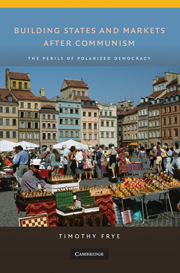Book contents
- Frontmatter
- Contents
- List of Tables and Figures
- Acknowledgments
- Introduction
- 1 The Political Logic of Economic and Institutional Reform
- 2 Political Polarization and Economic Inequality
- 3 The Pace and Consistency of Reform
- 4 Political Polarization and Economic Growth
- 5 Political Polarization and Policy Instability: The View from the Firm
- 6 Nationalism and Endogenous Polarization
- 7 Russia: Polarization, Autocracy, and Reform
- 8 Bulgaria: Polarization, Democracy, and Reform
- 9 Poland: Robust Democracy and Rapid Reform
- 10 Uzbekistan: Autocracy and Inconsistent Gradualism
- 11 Conclusion
- References
- Index
- Titles in the series
11 - Conclusion
Published online by Cambridge University Press: 05 June 2012
- Frontmatter
- Contents
- List of Tables and Figures
- Acknowledgments
- Introduction
- 1 The Political Logic of Economic and Institutional Reform
- 2 Political Polarization and Economic Inequality
- 3 The Pace and Consistency of Reform
- 4 Political Polarization and Economic Growth
- 5 Political Polarization and Policy Instability: The View from the Firm
- 6 Nationalism and Endogenous Polarization
- 7 Russia: Polarization, Autocracy, and Reform
- 8 Bulgaria: Polarization, Democracy, and Reform
- 9 Poland: Robust Democracy and Rapid Reform
- 10 Uzbekistan: Autocracy and Inconsistent Gradualism
- 11 Conclusion
- References
- Index
- Titles in the series
Summary
For fourteen months in the late 1980s, I traveled to six cities in the USSR as a guide on a cultural exhibit sponsored by the United States Information Agency that drew several thousand visitors a day. In the industrial city of Magnitogorsk, a middle-aged woman approached my stand and declared: “An American. A real live American. I never thought I would see a real live American.” This comment, made just over twenty years ago, gives some sense of the magnitude of the challenges that have confronted postcommunist societies over the past two decades. One cannot overstate the difficulty of taking societies with political and economic institutions designed to shutter society from the outside world into the twenty-first century.
To put the scope of this challenge in further perspective, it is helpful to consider the response of the advanced economies to the global financial crisis of 2008. Countries with long-standing market economies have debated the size of economic assistance needed to stimulate economic activity, whether to take shares in bankrupt financial institutions, and how to create sterner regulatory institutions that make a future financial collapse less likely while retaining the dynamism of the market. These changes have no doubt been painful in many countries, but they are mere tinkering in comparison to the overhaul of economic and political institutions in the postcommunist world, where the agenda included lifting price controls on almost all goods, moving complex industrial assets from state to private hands, and exposing firms sheltered from international competition for decades into a rapidly expanding global economy.
- Type
- Chapter
- Information
- Building States and Markets after CommunismThe Perils of Polarized Democracy, pp. 244 - 254Publisher: Cambridge University PressPrint publication year: 2010

